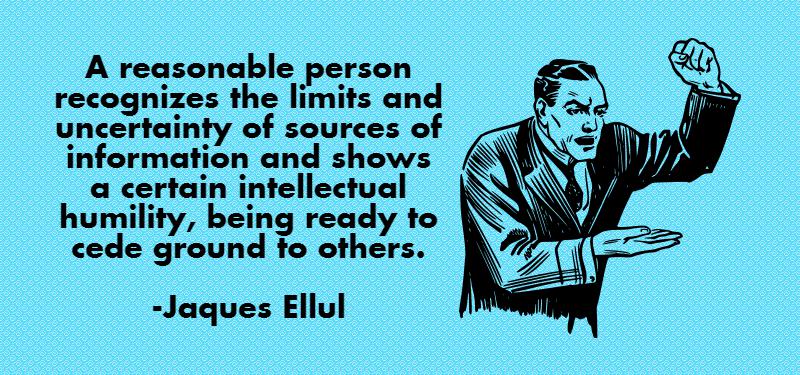The French philosopher Jaques Ellul literally wrote the book on propaganda methods throughout history and around the world.[1] Ellul examines propaganda as an existing sociological phenomenon in modern technological societies. One of his most important contributions is the distinction which he draws between agitation and integration propaganda.
Agitation propaganda appeals to anger and anti-social tendencies. Integration propaganda is subtle and perpetual; it speaks to our fundamental anxiety and our need to be part of the mass. In this post I'll explain both types of propaganda and elaborate on how you can make yourself less vulnerable to their effects.
Unchecked exposure to propaganda - even in a democratic society - tends to make people psychologically totalitarian. Propaganda works against dialog, towards belief systems which benefit the system as a whole, but make it genuinely hard for us to live together. So how do we avoid being influenced by propaganda? In short, by being a reasonable person.
Indentifying Agitation Propaganda
Agitprop is subversive because once it begins to direct a person's prejudices, it is harder for them to retreat or to reconcile with their perceived opponents. Propaganda in general does not allow for civil debate and reconciliation. Hate, anger and momentum are agitation propaganda's most effective resources. Ellul states:
"It is extremely easy to launch a revolutionary movement based on hatred of a particular enemy...Whether the object of hatred is the bourgeois, the Communist, the Jew, the colonialist, it makes no difference...Propaganda of agitation succeeds each time it designates someone as the source of all misery, provided that he is not too powerful. However, hatred once provoked continues to reproduce itself." [2]
Elements on both the so-called political left and right use agitprop, only against different targets. The list of groups ripe for demagoguery is broad. Agitation propaganda may target immigrants, white males, police, minorities, women, conservative Christians, Muslims, Republicans, Democrats, liberals, Trump voters, the rich, the uneducated, and so on.
Every time rhetoric oversimplifies complex political and sociological issues and boils them down to the level of a class of people being "the problem," or naming a common enemy who is the source of all ills, agitprop is there.
Indentifying Integration Propaganda
Integration propaganda relies on education to create pre-propaganda, or a fertile mental environment, that a propagandist can later work with.
We are not particularly equipped to deal with the relatively new conditions of living in modern society – the anonymity, the increasing pace of life and work, noise, crowded cities, family insecurity and the seeming absence of a meaning to life based on such conditions. This is where the psychology of integration propaganda comes into play, furnishing us with a myth strong enough to offset these obvious disadvantages.
“It is a matter of reaching and encircling the whole man and all men. Propaganda tries to surround man by all possible routes, in the realm of feelings as well as ideas, by playing on his will or on his needs, through his conscious and his unconscious, assailing both his private and his public life - It furnishes him with a complete system for explaining the world, and provides immediate incentives to action. We are here in the presence of an organized myth that tries to take hold of the entire person.” Ellul states. [3]
I have written a longer article about integration propaganda in modern societies which explains more about what this phenomenon is and isn't. One way to resist integration propaganda is to think for yourself and not worry if your conclusions differ from the norm.
Given that Ellul has made such a close study integration, it seems especially fitting that he would dislike conformity of thought and value the ability to think things through on one's own - even if one comes to conclusions which may seem excentric to the unthinking majority.
Psychological Totalitarianism
1. Of course I am not a victim of propaganda, because I am capable of distinguishing truth from falsehood.
2. I believe nothing my opponent says because everything he says is necessarily untrue. Ellul writes:
“With the help of propaganda one can do almost anything, but certainly not create the behavior of a free man. A man who lives in a democratic society and who is subjected to propaganda is being drained of the democratic content itself - of the style of democratic life, understanding of others, respect for minorities, re-examination of his own opinions, absence of dogmatism. The means employed to spread democratic ideas make the citizen, psychologically, a totalitarian man. The only difference between him and a Nazi is that he is a 'totalitarian man with democratic convictions,' And the citizen can repeat indefinitely 'the sacred formulas of democracy' while acting like a storm trooper." [4]
Being Reasonable As the Goal of Social Development and Antithesis of Propaganda
Ellul suggests that the best way to respond to the everpresence of this force in modern society is by not contributing to the problem - not responding with a propaganda of your own. Instead, respond with respectful debate, dialog, and cordial conversation.
These things are propaganda's antithesis, and the hallmarks of being a reasonable person - both open minded and not irrational. Ellul upheld the reasonable person (different from a rationalist) as the proper end goal of social and personal development. We become more reasonable by continually expanding our capabilities for self-examination, judgement, and self reliance.
A reasonable person recognizes the limits and uncertainty of sources of information and shows a certain intellectual humility, being ready to cede ground to others in the light of additional facts or better judgements. [5]
The key to resisting propaganda lies in not being easliy angered and showing proper respect for one's adversaries and for other people generally. It's not that all opinions are of equal value, but we should nevertheless respect differing opinions The end result of total propaganda is a pyschologically totalitarian man in a totalitarian society.
~
Sources:
- Ellul, J. 1973. Propaganda. The Formation of Men’s Attitudes. New York: Vintage Books.
- Ibid.
- Ibid.
- Ibid.
- Fortner, r. 2014. Handbook of Mass Media Communication Theory. West Sussex: Wiley. Google Books.
Related Posts:
5 Ways to Avoid Being Manipulated and Dumbed Down by the Media
4 Pieces of Stoic Wisdom for Dealing With Negative News Media











